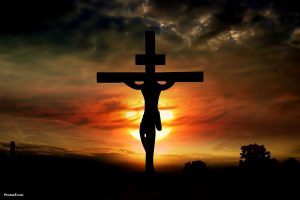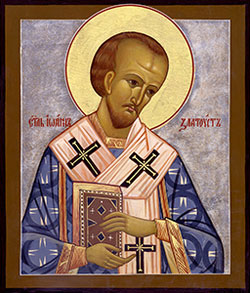Renewal and Revelation – St John Chrysostom
(Col 3:1-11; Ps 145; Lk 6:20-26)
********************************************
If you’re green you grow, if you’re not, you rot!
That rather striking statement carries a lot of truth and actually applies to today’s readings that invite us into a life-long process of renewal and transformation.
St. Paul, as usual, sets the tone in the first reading to the Colossians. He reminds them, and us, that we have been raised with Christ, that we are to seek the things that are above, that our real life is actually hidden in with Christ in God. He then very bluntly tells us to put to death whatever is worldly and clothe ourselves with our new self.
What St. Paul is trying to articulate and talk us into, is what our Eastern cousins call the process of theosis, or divinization. Unfortunately, we in the West with our love for technology, materialism, objectivity and rationalism, seem to have drifted away from that key element of our faith.
It is key because it was central for Jesus, who began his preaching with a clarion call to repent, to metanoia, to put on our highest mind, to change. He also taught that unless we become like little children, we cannot enter the kingdom of heaven. Today in the Gospel of Luke, he reverses all our usual values – blessed are the poor and humble, the hungry, those who mourn and those who are persecuted.
Over and above that, Jesus gave us the central pattern for our lives – passion, death and resurrection. This is not just something he underwent to save us – he demands that we follow him with the words, “Unless we take up our cross and follow him, we will not experience eternal life.”

The full pattern for Jesus involved six stages: passion, death, resurrection, appearances, ascension and Pentecost. For us, that pattern becomes hurt (we all get hurt in life), loss (something is lost and dies whenever we are hurt), survival (we are still here, but God wants thrivers, not survivors), grieving (letting go of our losses), forgiving (all those who have hurt us in any way) and finally experiencing eternal life (peace and joy) here and now. The key for us is that we forgive those who have hurt us in any way, and grieve our concomitant losses. Doing so opens up within us a space for God’s forgiveness and spirit to come and make its home in us. We begin to experience the peace and joy that only the Spirit of Jesus can give us.
The Beatitudes that Jesus teaches in the gospel are actually attitudes that belong to the kingdom of God. The woes are actually warnings not to become too attached to money, fame and power for that would hinder our entering into the kingdom of God here and now.
St. John Chrysostom, whom we honor today, is an example of someone who took the teachings of St. Paul and Jesus to heart and lived them. St. John Chrysostom was born in Antioch in 347 and was trained as an orator. He became a hermit in 374 but left due to poor health. He was ordained in 386 and became papal preacher, famous for his eloquent preaching. In 398 he became Patriarch archbishop of Constantinople and began reforms for clergy and laity alike. He was firm in political and ecclesial affairs and thus created enemies, including the Emperor. He was twice forced into exile to Armenia. After three years it was decided to send him further away, but he died en-route, worn out by his hardships. His sermons and writing did much to explain the Catholic faith and to encourage the living of Christian life. He was given the name “golden mouth” after his death and is honored as a saint in the Eastern Orthodox, Coptic and Catholic churches, as well as in some others.

St John Chrysostom
St. John Chrysostom describes this attitude beautifully in a homily in the Office of Readings for the feast of the conversion of St. Paul on January 25th. He writes, “The most important thing of all to St Paul, however, was that he knew himself to be loved by Christ. Enjoying this love, he considered himself happier than anyone else. Were he without it, it would be no satisfaction to be the friend of principalities and powers. He preferred to be thus loved and be the least of all, or even to be among the damned, then to be without that love and be among the great and honored. To be separated from that love was in his eyes, the greatest and most extraordinary of torments; the pain of that loss would alone have been hell, and endless, unbearable torture. So too, in being loved by Christ, he thought himself as possessing life, the world, the angels, present and future, the kingdom, the promise and countless blessings. Apart from that love nothing saddened or delighted him; for nothing earthly did he regard as bitter or sweet. Paul set no store by the things that fill our visible world, any more than a man sets value on the withered grass of the field. As for tyrannical rulers of the people enraged against him, he paid them no more heed than gnats. Death itself and pain and whatever torments might come were but child’s play to him, provided that thereby he might bear some burden for the sake of Christ.” St. John could write like that about Paul because he himself had many of the attributes of St. Paul.
The Eucharist is a celebration of faith that both forgives and heals us, and helps to take up our cross and follow Christ. May our celebration empower us to continue on a life-long journey of renewal and transformation, of theosis and divinization.




Hello, thanks for the homilies once again and I don’t know how to please you. You have a very good homily about Eternal Life and Kingdom of God. There is someone who is trying to block me from seeing your posts or homilies on Facebook and on your website. This is using the IPad… That is why I was late seeing your homilies today, there is someone out there controlling my computer I can not even check my emails because the Application keeps on shutting down from 1 min. I do not know if the Wifi being too slow or what. Hopefully I am not causing any problems for your computer…since I came along. Tanya